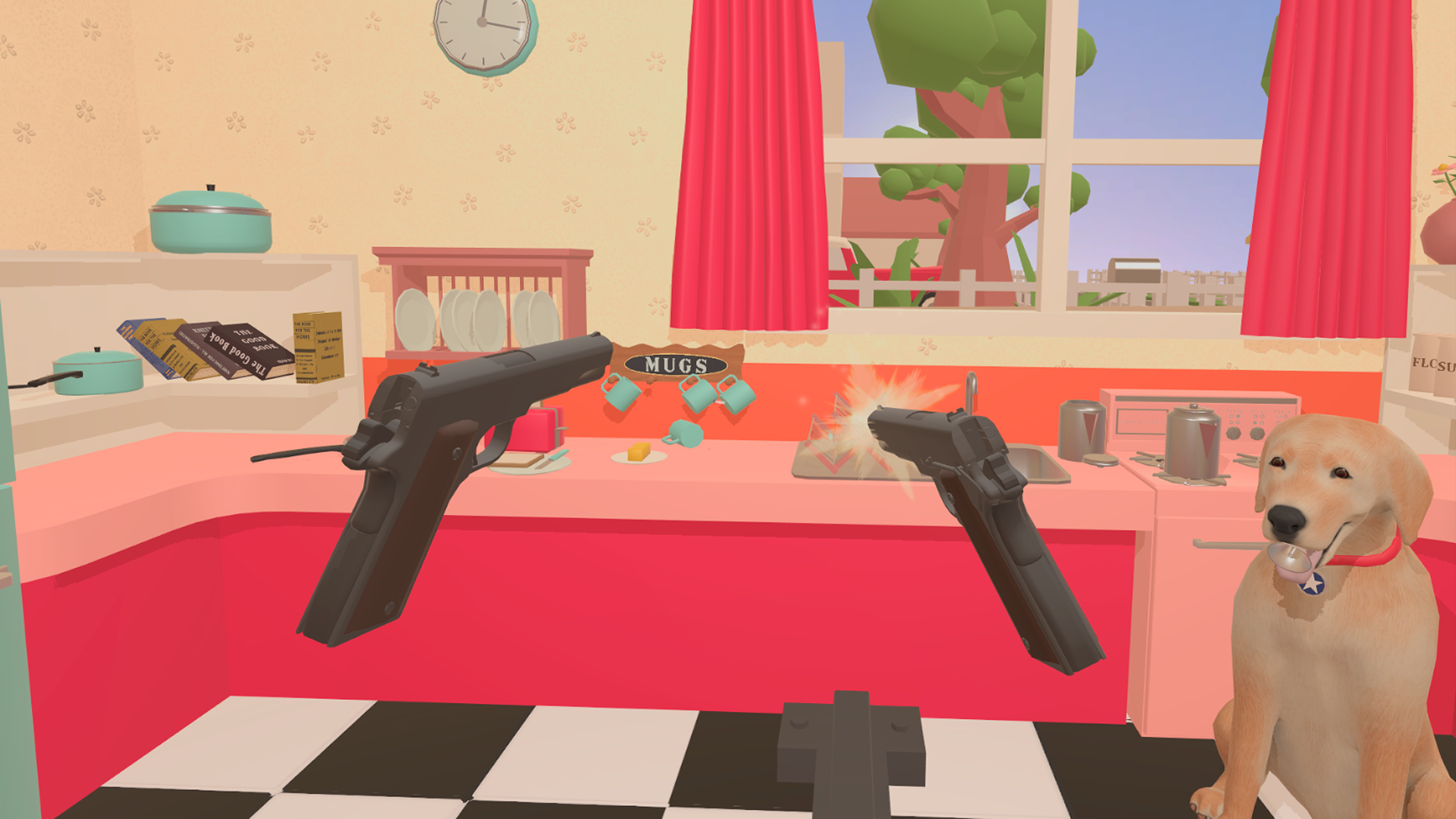The American Dream is a game about performing menial tasks with guns
Go bowling with guns, go to the prom with guns, do everything with guns.

The American Dream is a videogame about living life with guns. In other words, one must eat donuts with guns, perform quality assurance with guns, go bowling with guns, and take dates to the prom with guns. Developed exclusively for VR, it’s the work of Screencheat studio Samurai Punk, a young outfit based in Melbourne, Australia.
Melbourne is far away from America – the country whose gun laws are ostensibly being satirised. As it turns out, The American Dream wasn’t really borne of the studio’s desire to make a statement about US gun laws. Instead, the concept has its origins in something more meta, namely the rarely-dwelled-upon fact that in first person shooter games, it’s usually only possible to shoot things. Sometimes, the only way to open doors or flick switches is to shoot them. Guns are the most useful tool in a videogame character's arsenal.
“It started out as an introspection I was having with a lot of FPS games that I’d played,” Samurai Punk artist Nicholas McDonnell said. “I’ve played a lot, I’ve made an FPS game, and I was getting a bit confused as to why I was doing so much of that.
“Historically, most FPS games come out of the US. When [graphical leaps] allowed us to, that’s the first thing we did: we started making shooting games. It became a North America-themed game when I figured out it’d be a good lens through which to demonstrate that. Obviously, when you start talking about guns, the conversation about America comes up a lot.”
The American Dream takes the form of an on-rails shooter travelling through a theme park roughly modelled on Disney’s Epcot Center, an attraction dedicated to technology and a "brighter tomorrow". In The American Dream, the attraction is a means for gun manufacturers to demonstrate their wares. These shills want you to see that guns can be used for more than just killing living creatures. Indeed, guns can be used for everything, according to the gun shills, and the game is basically a collection of vignettes forcing the player to learn how this might be achieved.
In the short demo I played, I was ensconced in a cot and forced to answer a questionnaire with my gun. Then I needed to attract the attention of my mother with my gun. Later, I had to work as a quality control worker, which involved me making holes in donuts, and removing gross looking donuts off conveyer belts... with my gun. These are very simple demonstrations of the concept: I dual wielded pistols during my playthrough, but the game will also feature machine guns and shotguns.
“We were experimenting with different guns that allow us to do different [types of] gameplay, because in this game, a gun isn’t a tactical advantage in a certain situation, they function more like different tools for life,” McDonnell said. “We have to try to abstract what a long rifle provides gameplay-wise, as opposed to a pistol, which is small and light and easy to handle.”
The biggest gaming news, reviews and hardware deals
Keep up to date with the most important stories and the best deals, as picked by the PC Gamer team.
One of the neatest aspects of The American Dream is its reload system: basically, you need to bang the butt of your gun on a button in order to trigger a magazine dispenser, which itself triggers a short slow motion sequence, during which you need to capture it in your weapon. It ties into one of the important tenets of the game: the studio couldn’t have the player use their hands to reload a weapon, because you’re not meant to use your hands. Guns are meant to do everything, but crucially, in The American Dream, guns are never used for violent means.
“We have to do the ‘don’t make guns violent’ pass [on every vignette], because the game is all about making guns non-violent,” McDonnell said. “You can’t say ‘don’t make the boss angry, he has a gun and he’ll shoot you’ because that doesn’t work. The universe we’re creating is one where guns are perfect, they’re like a multi-tool, they can solve all your problems and they don’t shoot people.”
It’s an amusing concept, and during the 20 minutes I spent playing The American Dream, I found it much funnier than I expected. I did initially question the ability of three young Australian developers to handle this idea effectively. I feared it'd be overly dogmatic, or celebratory, or else totally tone deaf – but taken as a lighthearted critique of first-person shooters, it works.
Will it work as a game, though? Despite the fledgling status of VR, audiences are already growing tired of bite-sized games like The American Dream. And yet, that reality means games are provided the luxury of playing with simple concepts that might not gel in a larger, more time-intensive game.
As for McDonnell, he reckons that’s just where the tech is at. “As a person playing VR a fair amount at the moment, I think [this type of game prevails] because the tech isn’t 100 percent there in terms of comfort and long term use. They all have their own quirks: if you wear glasses you can only really use PSVR because the others don’t have enough space. The Oculus is a bit bright, and hurts your eyes after a certain amount of time. It’s not the kind of platform that you feel comfortable with for a long time.
“Because of the nature of the platform, I think bite-sized content works best right now and I don’t think that’s a negative,” McDonnell said. “To some extent it’s actually great because it means you can create stuff and succeed with it in a manner which you’d get abused for on another platform. That’s where we ended up with walking sims. They were getting abused because they were short form – and they wanted to be – and in our case it’s the same. We’re trying to do something with our game which wouldn’t be effective on another platform."
The American Dream is due to launch in 2017.

Shaun Prescott is the Australian editor of PC Gamer. With over ten years experience covering the games industry, his work has appeared on GamesRadar+, TechRadar, The Guardian, PLAY Magazine, the Sydney Morning Herald, and more. Specific interests include indie games, obscure Metroidvanias, speedrunning, experimental games and FPSs. He thinks Lulu by Metallica and Lou Reed is an all-time classic that will receive its due critical reappraisal one day.

